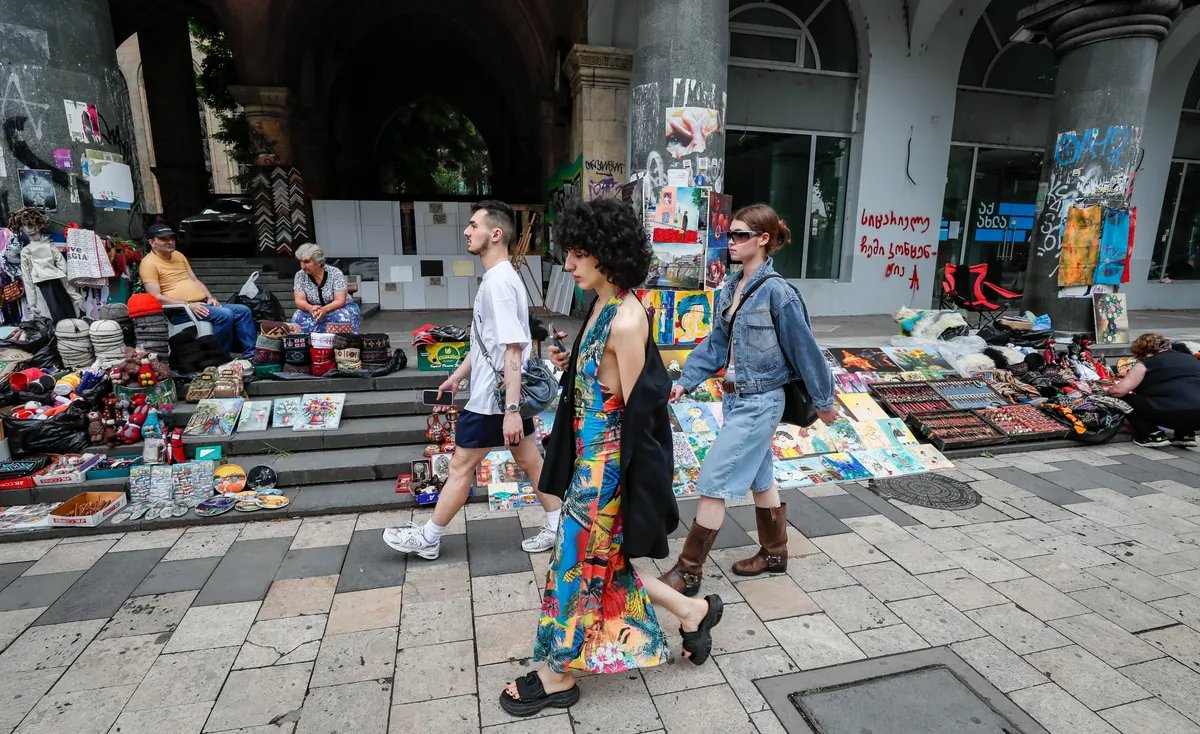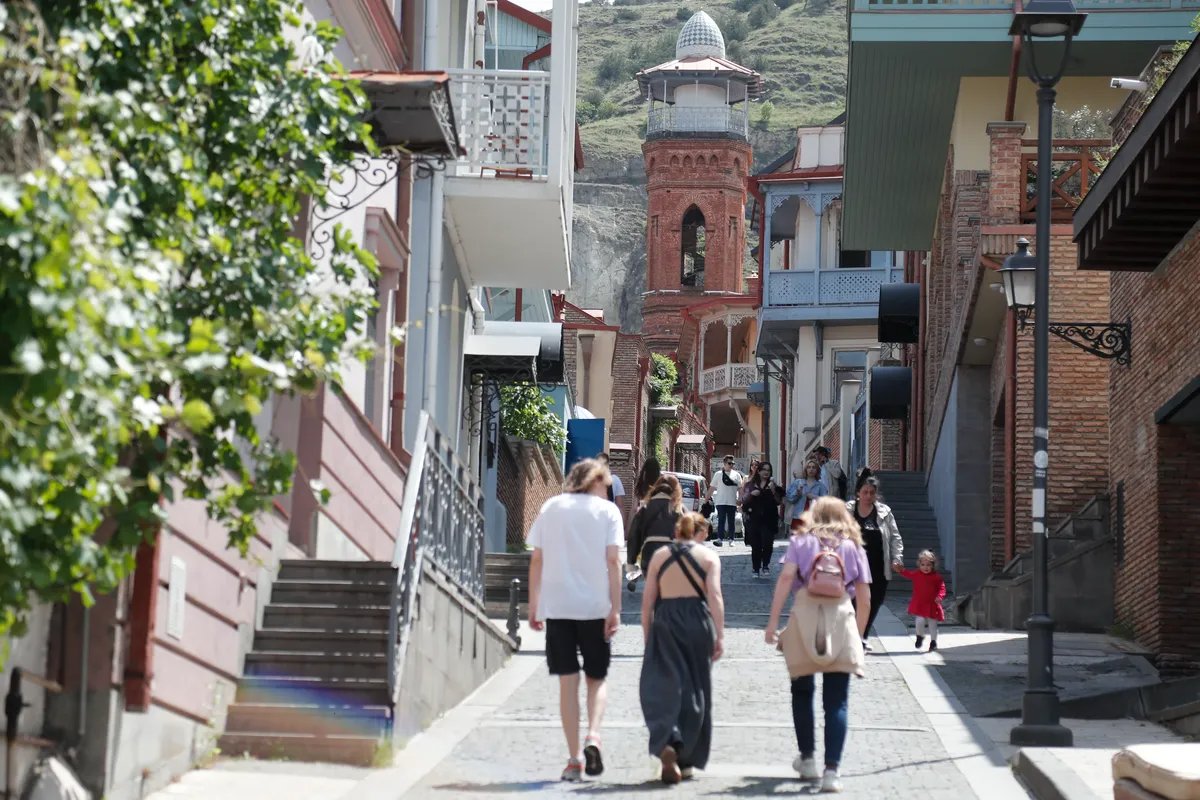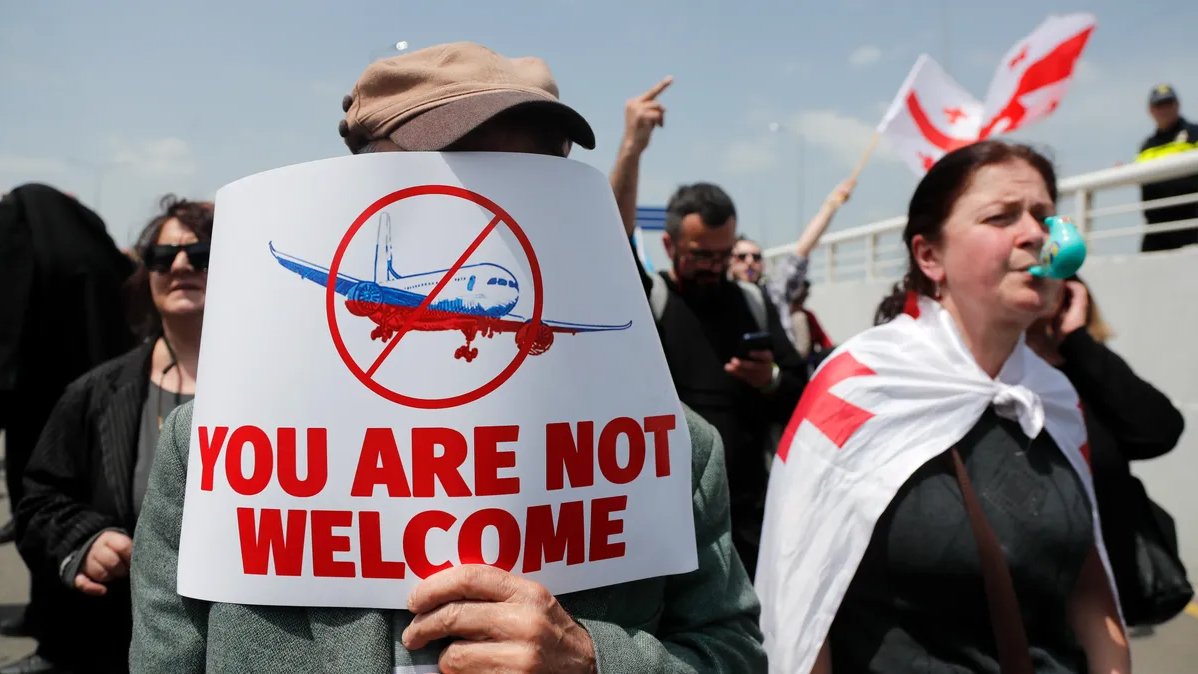“How do you say ‘sorry’ in Georgian?”, the children of Russian acquaintances who moved to Georgia last year asked me. I slowly pronounced the tongue-twisting “u-kats-ra-vad”. And I thought: what well-mannered children — Russians had never asked me that before.
Now I sometimes hear this word spoken with a Russian accent in Tbilisi and Batumi — the occasional neatly Muscovite “ukatsravad” in the street or in the supermarket queue.
Who could have imagined two years ago that Russians would be learning Georgian on a mass scale?
That Russia would be shaken so badly that a million people would flee from it, that a hundred thousand would end up in Georgia and many would dream of a Georgian residence permit or a humanitarian visa to Europe?
Fifteen years have passed since the Russo-Georgian war, and now Russia is at war again, and this new war in Ukraine is much more monstrous, although it is a continuation of the one in Georgia.
It turns out that Georgians simply cannot get away from Russians: they have to somehow balance their hatred of Putin’s regime and fervent support for Ukraine with the need to say hello to the Russian tenants on the floor below.
And they also have to deal with their own government, which is boosting economic growth at the expense of Russian refugees while fending off accusations of playing along with the Kremlin.

Tbilisi, 20 June 2023. Photo: EPA-EFE / YURI KOCHETKOV
You could say that we are literally surrounded by Russians.
And yet these 15 years have left their trace: Georgians have learnt to keep their distance. We perceive Russia as a completely different country, no longer close either spiritually or geographically. We are definitely not one nation. Although, perhaps, Russians themselves benefit from speaking other languages and realising that they are not at home just anywhere.
In August 2008, Georgia became the first post-Soviet country that Russia invaded openly, using its regular army. Before that, the Red Army had invaded independent Georgia in 1921.
I know that this is frowned upon, but sometimes I imagine that instead of the militant Communists, it was the bourgeois revolution that had won in Russia in 1917. The empire would have dissolved in a more or less civilised, European way, and Russians and Georgians would have probably stayed in a common cultural and economic space for a long time, of their own accord.
But instead after the Russian empire, Georgia wound up in the Soviet empire, and after the collapse of the latter we got repeatedly punched for striving to leave the USSR as much as the Baltic states did. We had two hybrid wars in Abkhazia and Tskhinvali in the 90s, when territories were seized from us and turned into Russian military bases.
Georgians lived with this perceived futility of frozen conflicts for so long that it seemed that the issues of territorial integrity could be ignored altogether. After all, both [Georgian presidents] Shevardnadze and Saakashvili began their stay in office by trying to improve relations with Moscow, since it is traditional to be friends with one’s neighbours.
The 2008 war laid claim not to a particular piece of land, but to Georgia’s sovereignty itself. Georgians reacted by once again fleeing from everything that reminded them of the USSR. It was in August 2008 that Georgia withdrew from the Commonwealth of Independent States and severed diplomatic relations with Russia. “Imagine that there is a sea instead of Russia,” former Georgian Economy Minister Kakha Bendukidze said at the time.

Tbilisi Old Town, 10 May 2023. Photo: EPA-EFE / ZURAB KURTSIKIDZE
But the Russians did not forget about us.
Do you know what was the strangest thing to happen in Georgian-Russian relations after the war? The boom in Russian tourism. Even propaganda couldn’t do anything about it.
20% of tourists in Georgia were Russian.
By the way, it is unclear why [Russian propagandist] Olga Skabeyeva is now indignantly asking Russians: “Why the hell are you going there?”. Back in 2018, she seemingly had no issue with posting photos with “Tbilisi is love” from her holiday in Georgia while at the same time pedalling stories about mosquitoes from Georgian laboratories threatening Russians.
Over the past decade, the Russian state has been trying to mend relations with Tbilisi by the usual imperial means in its arsenal: for example, funding far-right “patriot” parties who call for the bolstering of family values to fight gays, and suggesting to be friends with Moscow for the chance to get back Abkhazia.
Moreover, Russia has chosen this moment to cancel the visa requirement for Georgians — a feature that it introduced 23 years ago, back when it was still Shevardnadze “misbehaving” and not Saakashvili.
It turns out that Georgia has become something of a hobby for Moscow — why quarrel with someone neutral and friendly “while the world is bent your deeds to cross”, as Shakespeare put it.
Will Moscow’s belated commitment help to bring Georgians back into the orbit of Russian influence? Hardly. Who needs a ticket to Moscow for €400 when there are flights to Europe for €30?
In the meantime, the [Bidzina] Ivanishvili government continued a pro-European policy, but kept looking back at Moscow. At first, some even liked this caution. But after the Russian invasion of Ukraine, it became clear that the policy of not annoying Moscow irritated Georgians themselves to the point of rallies with thousands of demonstrators.
That is why no sensible member of the current government would dare publicly say that Georgia should abandon the prospect of a European rapprochement or, God forbid, join the CSTO, a post-Soviet security bloc.
Besides, a new generation has grown up in Georgia — one which does not owe anything to the empire but has something to dislike it for.
Over the last 15 years, there has been incessant talk of “creeping annexation” — the installation of barbed wire along borders known only to the Russian military, which has led to Georgia losing miles of its soil and many people losing their homes and land.
About once a month, we learn about the capture of yet another villager who was unlucky enough to live near the wire border. Russian “border guards” detain people for going to an old church or visiting cemeteries. These people are then tortured by their fellow believers, put in prison in Tskhinvali, forced to pay a fine, and sometimes killed.
Anyone driving through [the city of] Mtskheta can see the large settlement of Tserovani, where refugees from Georgian villages in the Tskhinvali region have been living for 15 years, or overhear a minibus driver say that the Russian military post can be seen even from the central motorway.
Despite the fact that the ruling party and the opposition argue every year about whether the war should be commemorated on the 7 or 8 August, for the last 15 years both days have seen state flags lowered and politicians carry flowers to the military cemetery in Mukhatgverdi.
But the days of mourning will end, Georgians will still support Ukraine and take to the streets to call out their government, and the empire is sure to leave us all alone someday. We might even celebrate that day with the Russians who live in the neighbourhood — especially those who have learnt the word “ukatsravad”.
Join us in rebuilding Novaya Gazeta Europe
The Russian government has banned independent media. We were forced to leave our country in order to keep doing our job, telling our readers about what is going on Russia, Ukraine and Europe.
We will continue fighting against warfare and dictatorship. We believe that freedom of speech is the most efficient antidote against tyranny. Support us financially to help us fight for peace and freedom.
By clicking the Support button, you agree to the processing of your personal data.
To cancel a regular donation, please write to [email protected]

